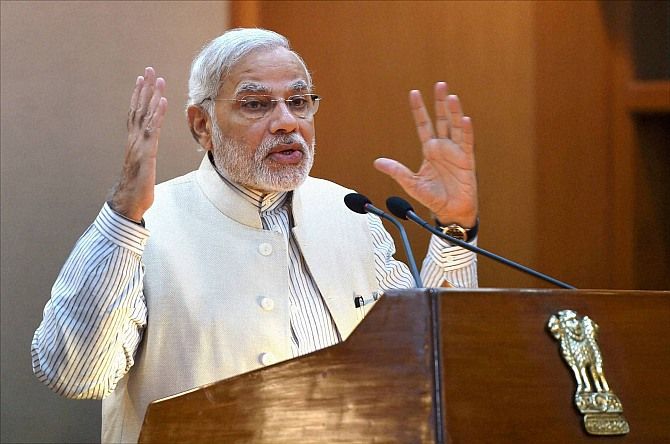From a ruling party's perspective, the BJP is in a sweet spot; editorial independence and analytical coverage of governance is rapidly declining. Rahul Jacob explains
Last Saturday, Prime Minister Narendra Modi was in an unusually expansive mood with the media at a Diwali Milan lunch.
He reminisced about once having put out chairs at the Bharatiya Janata Party's meetings with the press when he was party general secretary. He praised the press for its help in publicising his effort to clean up India.
"You have turned the pen into a broom," Modi said. Towards the end, he posed for selfies with several journalists. Equally significantly, he took no questions from the assembled reporters.
The Diwali Milan made some wonder as to whether the prime minister's approach to the Fourth Estate is changing and, if so, does it need to.
The likely answer is no.
An early assessment of the government's media strategy of tweets and press handouts is that it has succeeded spectacularly.
One-way communication works when you run a tightly controlled government where bureaucrats and ministers are cautioned not to speak to the press out of turn -- or indeed not to speak to the press at all. (The contrast with the haphazard communications of the Congress in opposition could not be more stark.) 
The scarcity premium on news and leaks makes the media even more prone to rush to cover things.
The Modi government's launch of Jan Dhan Yojana in late August was an example of this.
The target of 75 million accounts was played up, with only a few papers reporting that the previous government had opened 61 million accounts in the last financial year alone.
Moreover, the real problem is that the vast majority of new accounts lie dormant and end up being a heavy cost for India's public sector banks, the subject of a negative rating from Moody's on Wednesday. There are less-publicised but more practical ways to achieve financial inclusion.
In Bangalore, Khosla Labs is helping kirana stores open bank accounts and log transfers of money as the front office for public sector banks while leveraging the computing power of a smartphone combined with the powerful backbone of Aadhaar biometric identification.
Looking at a big screen in the office, I discovered a small shopkeeper in Hyderabad had opened half a dozen accounts using Novopay the previous night, incredibly till 1.30 am.
There was little time for follow-up stories on Jan Dhan Yojana, however, before the Make in India press conference unfolded with its neon handouts that looked like a hybrid of Amar Chitra Katha and Soviet-era art, with a few bad puns thrown in. 
The government may have decided not to include the media on the prime minister's plane to the United States, but nearly all the luminaries of Indian television were in New York anyway, with mostly glowing stories about how the prime minister was taking the United States by storm. State broadcaster Doordarshan looked impartial in comparison.
It fell to R Nicholas Burns, an under-secretary of state in the Bush administration and now a professor at Harvard, to question what exactly the prime minister had achieved in terms of furthering the two countries' ties.
"He missed an opportunity to signal how he intends to put his own imprint on the government-to-government relationship that is so important," Burns wrote in The Boston Globe a few days ago.
An independent website, Scroll.in, curated two of America's most popular TV talk show hosts lampooning Modi's odd conclusion to a speech at Central Park. For reasons only the prime minister's inept English-language speechwriters will be able to explain, he used the tired, hokey line, "May the force be with you", as he said goodbye. A variant of that phrase was first used by Alec Guinness in the first Star Wars -- in 1977.
Little of this was highlighted in the mainstream media in India, anyway, partly because large media houses seem determined to stay focused on the positive. From a ruling party's perspective, the BJP is, thus, in a sweet spot; editorial independence in India - and with it, analytical coverage of governance -- is rapidly declining. There is little reason to waste one's energies with press conferences; a press handout works so much better.
Temperamentally, Modi is a leader in a hurry who is impatient with small talk, and one who would find the thrust and parry of media conversations trying. 
Veteran journalists who covered Modi in Ahmedabad say he gave short shrift to press conferences and questions he found inconvenient. Similarly, nowadays, "Right to Information" requests are posted on ministry websites by the central government, but answered opaquely, giving as little away as possible.
In a country known for bureaucratic complacency, the prime minister's haste is seen by the public as creditable.
Yamal Vyas, who worked closely with Modi in Gujarat, remarks that he has never seen someone as focused as Modi.
If a meeting is on a particular theme, "you will see some senior leaders speak about other things", Vyas told me in April. "He will ignore the digression. His ability to ignore (distractions) is phenomenal."
The story doing the rounds is that work on the recent coal ordinance started with senior bureaucrats meeting a well-briefed Mr Modi on Friday. After an hour or so, Modi gave the civil servants till Monday to work on the ordinance, even though it meant they would have time for just a few hours sleep in the interim.
Expect the blitzkrieg of incremental administrative reforms to continue to receive banner headlines; and he is soon to embark on a week-and-a-half tour of Australia, Fiji, Myanmar... I can't keep up, nor can most of the media.
Modi's charisma is powerful enough to make his case without the media's help, partly because its currency is devalued.
With a press alternately acquiescent or, on TV, inclined to inanely shout rather than ask questions, the prime minister can hardly be blamed for concluding that he has better things to do with his time.










